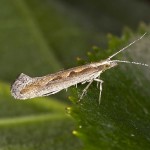Cornell University researchers are combining two biotechnologies to control diamondback moths with sex instead of insecticide. The pesky feeders on crucifer crops, including canola, mustards and vegetables, have developed resistance to many insecticides as well as Bt (Bacillus thuringiensis), a soil bacteria that has been genetically engineered into corn and cotton to help control such






